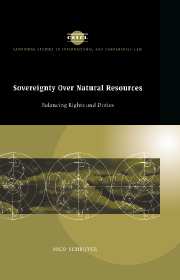Book contents
- Frontmatter
- Contents
- List of boxes, figures and tables
- Preface
- Acknowledgments
- List of abbreviations
- List of main symbols used in UN documents
- Glossary
- Table of cases
- 1 Introduction
- PART I The birth and development of the principle: the UN General Assembly as midwife
- PART II Natural-resource law in practice: from creeping national jurisdiction towards international co-operation
- PART III Balancing rights and duties in an increasingly interdependent world
- Introductory remarks to Part III
- 9 Rights and claims: seeking evidence of recognition in international law
- 10 Duties: the other side of the coin
- 11 Sovereignty over natural resources as a basis for sustainable development
- Appendices
- Bibliography
- Index
- Books in the series
11 - Sovereignty over natural resources as a basis for sustainable development
Published online by Cambridge University Press: 23 October 2009
- Frontmatter
- Contents
- List of boxes, figures and tables
- Preface
- Acknowledgments
- List of abbreviations
- List of main symbols used in UN documents
- Glossary
- Table of cases
- 1 Introduction
- PART I The birth and development of the principle: the UN General Assembly as midwife
- PART II Natural-resource law in practice: from creeping national jurisdiction towards international co-operation
- PART III Balancing rights and duties in an increasingly interdependent world
- Introductory remarks to Part III
- 9 Rights and claims: seeking evidence of recognition in international law
- 10 Duties: the other side of the coin
- 11 Sovereignty over natural resources as a basis for sustainable development
- Appendices
- Bibliography
- Index
- Books in the series
Summary
This chapter highlights the main points of this study and draws some conclusions on the issues raised by the questions posed in chapter 1. The first set of questions related to the origin, development and legal status of the principle of permanent sovereignty over natural resources (‘permanent sovereignty’). This chapter deals with the two-fold origin of the principle, namely the sovereignty of States and the self-determination of peoples. The question of the law-creating functions of the UN General Assembly and the status of the principle in current international law, especially whether it can be accorded the status of jus cogens, are then discussed in turn.
Principles and rules of international law do not function in a vacuum, but in the living reality of a changing world. In line with the second set of questions, this chapter discusses the changing international context of the principle of permanent sovereignty, in particular the impact of changing perceptions of the scope of State sovereignty in an age of globalization, privatization, fragmentation and environmental deterioration. The developments in international investment law and the current significance of the ‘national’ and ‘international minimum’ standards are considered, as well as the question of the management of resource- and foreign-investment-related conflicts and the continuing contribution of the principle of permanent sovereignty as an instrument of protection and development.
- Type
- Chapter
- Information
- Sovereignty over Natural ResourcesBalancing Rights and Duties, pp. 368 - 396Publisher: Cambridge University PressPrint publication year: 1997

